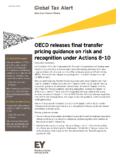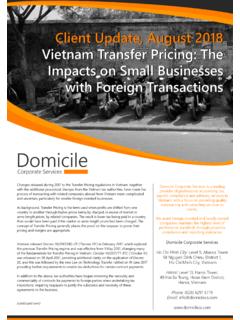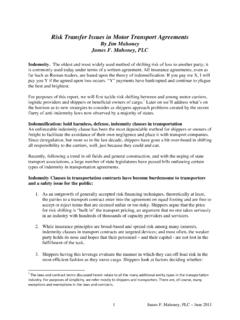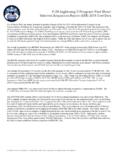Transcription of The new BEPS and transfer pricing law passed in Hong Kong
1 news Flash Hong Kong Tax The new BEPS and transfer pricing law passed in Hong Kong July 2018 Issue 9 In brief The Legislative Council passed the base erosion and profit shifting (BEPS) and transfer pricing (TP) Bill ( the Inland Revenue (Amendment) (No. 6) Bill 20171 (the Bill)) on 4 July 2018. The Bill will be enacted as Inland Revenue (Amendment) (No. 6) Ordinance 2018 (the BEPS and TP Ordinance) and come into force after it has been signed by the Chief Executive and published in the Gazette (expected to take place by 13 July 2018). This is a milestone in Hong Kong taxation as the BEPS and TP Ordinance formally introduces a TP regulatory regime and TP documentation requirement into Hong Kong tax legislation.
2 In embracing the BEPS initiatives taken by the Organisation for Economic Co-operation and Development (OECD), the BEPS and TP Ordinance also implements the various minimum standards under the OECD s BEPS Action Plan in Hong Kong. Please refer to the Appendix for a summary of the effective dates and the relevant deadlines (where applicable) of the key measures in the BEPS and TP Ordinance. The BEPS and TP Ordinance, while borrowing heavily from the OECD s BEPS Action Plan, is the first piece of legislation explicitly addressing TP matters in Hong Kong. It is a lengthy and complex piece of legislation with intricate provisions.
3 In addition, many uncertainties on the interpretation and practical application of the provisions in the law remain and further guidance will need to be issued by the Inland Revenue Department (IRD) in new or revised Departmental Interpretation and Practice Notes (DIPNs). Business groups should continue to keep a close eye on the developments in this space and carefully assess if and how the provisions in the law apply to them. In detail The lengthy tax legislation that implements a TP regulatory regime and various minimum standards under the BEPS Action Plan in Hong Kong will soon come into operation. This Hong Kong Tax news Flash recaps the most important measures introduced by the BEPS and TP Ordinance and the effective dates of those measures.
4 For a more detailed discussion of the Bill originally gazetted in December 2017 and the subsequent major Committee Stage Amendments to the Bill, please refer to our previous Hong Kong Tax news Flashes and transfer pricing news Flashes2. The TP regulatory regime The BEPS and TP Ordinance codifies the arm s length principle into the Inland Revenue Ordinance (IRO) and empowers the IRD to impose TP adjustments on either income or expense arising from non-arm s length transactions between associated persons that give rise to a potential Hong Kong tax advantage (TP Rule 1). Certain domestic transactions that do not give rise to any actual Hong Kong tax difference will be specifically exempted provided that certain prescribed conditions are met3.
5 In addition to TP Rule 1, TP Rule 2 is introduced to require the use of the separate enterprises principle for attribution of profits to a permanent establishment (PE) of a non-Hong Kong resident in Hong Kong. Under TP Rule 2, the Authorised OECD Approach (AOA) will be adopted for PE profit attribution. This will be of particular relevance to banks and insurance companies that often maintain Hong Kong branches. TP Rule 1 will apply retrospectively to years of assessment (YOA) beginning on or after 1 April 2018 ( from YOA 2018/19) whereas TP Rule 2 will apply to YOAs beginning on or after 1 April 2019 ( from YOA 2019/20).
6 PE profit 2 news Flash Hong Kong Tax attribution is particularly complex hence the HKSAR Government has postponed implementation of TP Rule 2 to allow sufficient time for taxpayers that require a transition to using the AOA. However, there is a grandfathering provision whereby transactions entered into or effected before the commencement date of the BEPS and TP Ordinance will not be subject to the explicit TP rules, but such related party transactions may still be subject to the IRD s challenge under section 16(1) or section 61A of the IRO.
7 The TP documentation requirement The BEPS and TP law introduces a mandatory three-tiered TP documentation requirement in Hong Kong consisting of the following: 1. Master File; 2. Local File; and 3. Country-by-Country (CbC) report. Master File and Local File The law provides two types of exemptions to entities that engage in transactions with associated enterprises from preparing Master File and Local File. The exemptions set out thresholds based on (i) the size of the business and (ii) the volume of different categories of related party transactions. (i) Size-based business exemption thresholds Throughout the Bills Committee stage, the HKSAR Government revised the size-based thresholds in response to comments from the deputations.
8 As in the BEPS and TP Ordinance, a Hong Kong taxpayer meeting any two of the below three size-based business exemption thresholds for an accounting period is exempted from preparing the Master File and Local File for that accounting period: 1. Total annual revenue not exceeding HK$400 million 2. Total value of assets not exceeding HK$300 million 3. Average number of employees not exceeding 100 (ii) Volume-based related party transaction exemption thresholds The volume-based related party exemption thresholds remain the same as those proposed in the Bill. However, one important distinction is that certain qualifying domestic transactions can be excluded from the thresholds and do not need to be documented in the Local File.
9 If a Hong Kong taxpayer s amount of a particular category of related party transactions for an accounting period does not exceed the prescribed threshold, the entity is not required to prepare a Local File for that category of transactions for that accounting period. The following thresholds (per accounting period) apply for each category of related party transactions for exemption purpose: 1. Transfers of properties (excluding financial assets / intangibles): HK$220 million 2. Transactions in respect of financial assets: HK$110 million 3. Transfers of intangibles: HK$110 million 4. Any other transactions: HK$44 million If a taxpayer does not need to prepare a Local File for all of the above specified categories of related party transactions, the taxpayer is not required to prepare the Master File as well.
10 Unless either of the above size-based or volume-based exemptions applies, a Hong Kong taxpayer is required to prepare Master File and Local File for an accounting period within nine months after the end of that accounting period. Master File and Local File are required for accounting periods beginning on or after 1 April 2018. For entities with a 31 December year-end date, this means that the first year of application is for the accounting year ending on 31 December 2019, with the completion of the files by 30 September 2020. CbC report A Hong Kong ultimate parent entity (UPE) of a multinational enterprise group with prior year annual consolidated group revenues of HK$ billion or above (approximately 750 million Euros) ( a reportable group) is required to file a CbC report in Hong Kong, unless the surrogate parent entity-filing-elsewhere exception applies.







